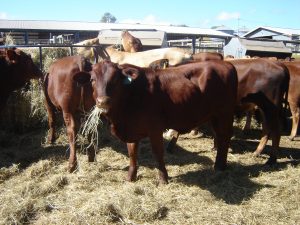
Be aware that WHPs for crop harvest and animal consumption may be different. (Photo: Tracy Longhurst)
With current rainfall so uncertain, there is the potential for crop failures this season. If these crops are cut for hay, or grazed, it is critical that the withholding period (WHP) of any insecticide treatments are considered.
The WHP is the minimum period that needs to elapse between the last use of the product and the harvesting or cutting of the crop, or the grazing of animals on the crop or crop residues. A WHP for harvest and grazing/cutting for stock food is listed on insecticide labels.
WHPs vary widely across products, even within product groups. For example amongst synthetic pyrethroids, the WHP is commonly around 2 weeks, but can be as long as 6 weeks. For stock destined for export, even longer WHPs may apply.
The table below includes examples of the grazing/cutting for stock food WHPs for a range of insecticides that may have been used in crops this season.
| Active (e.g. trade name) | Pest | Crop | WHP (days) Grazing or cutting for stock food. |
| Sulfloxaflor (Transform®) Group 4C |
Aphids | Canola | 14 |
| Wheat/barley | 14 | ||
| Synthetic pyrethroids (e.g. Alpha Scud™, Astound™)1 Group 3A |
Helicoverpa Armyworm |
Wheat/barley Canola Winter pulses |
14d – 5 weeks2 |
| Pirimicarb (e.g. Aphidex™) Group 1A |
Aphids | canola | 14 |
| Wheat/barley | 6 weeks | ||
| 1 Check the label as there is considerable variation depending on the active and the crop 2 The longest WHP are for winter pulses (chickpea, faba beans). |
|||
For a complete list of products and WHPs, consult the Safemeat website.
Records of pesticide use in crops prior to cutting for hay may be requested by buyers in order to complete their vendor declarations. It is an offence to sell hay made from a crop where the WHP has not expired, unless the seller notifies the buyer in writing that the WHP has not expired.
For more information, see Meat and Livestock Australia’s (MLA) article Do you know the residue rules?
